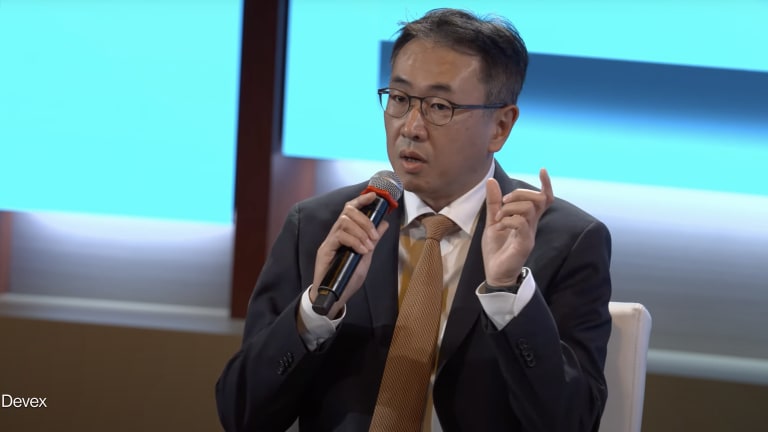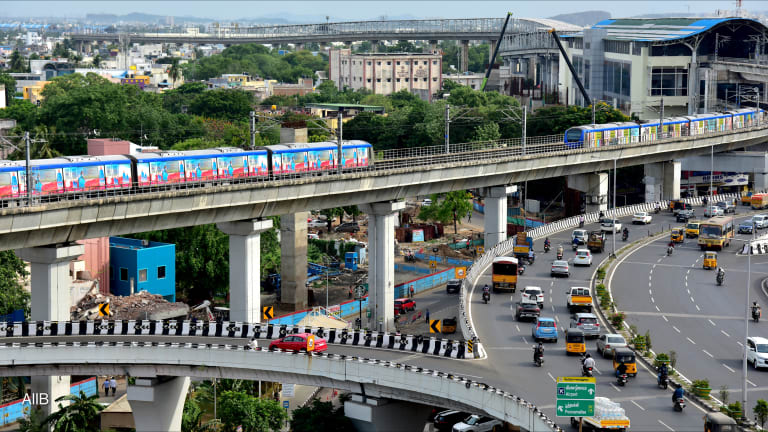More than infrastructure: WEF's Eric White talks internet for all
Devex speaks to the head of the World Economic Forum's Internet For All initiative about why the group fills a gap in internet access efforts and where it will be focusing its attention in the year ahead.
DAVOS, Switzerland — One of the outcomes of this year’s World Economic Forum Annual Meetings in Davos, Switzerland, was that Mercedes Aráoz, prime minister of Peru, announced plans to launch an Internet for All program in 2018. The Internet for All initiative is an effort by the World Economic Forum to bring together stakeholders from a range of sectors to address key barriers to internet inclusion. It launches platforms at the national, regional, and global level in order to extend access to the internet to the hardest to reach. Devex spoke with the initiative’s lead, Eric White, ahead of the World Economic Forum meetings last week to talk about its model, accomplishments so far, and goals moving forward. A new focus for 2018 would be the divide caused by the Fourth Industrial Revolution, White said, referring to the term World Economic Forum founder Klaus Schwab uses to describe this new era of technological transformation. “The Fourth Industrial Revolution is going to fundamentally transform the global economy: new types of businesses, new winners, and maybe new losers,” he said. “It’s safe to say businesses that leverage the Fourth Industrial Revolution effectively are going to develop in places with robust internet ecosystems. When we think about the digital divide now and how it contributes to inequality, if the Fourth Industrial Revolution is built on top of the digital divide, it could exacerbate inequality.” That risk brings an even greater sense of urgency to the World Economic Forum’s efforts to provide internet for all. “It’s not all about infrastructure,” White said. When people think about new ways of getting people online, they think of Google’s balloons, Facebook’s drones, maybe OneWeb’s satellites. “I really hope they all work out and succeed wildly, because that would be great, but there are other huge issues,” he pointed out. “Smartphone pricing is a huge issue. If we could have a $20 smartphone available, you would see a lot more people using the internet. Digital skills are a huge issue. So is content. There is more to it than just infrastructure and I do think people are starting to wake up to that,” he said. “There is more to [getting people online] than just infrastructure and I do think people are starting to wake up to that.” --— Eric White, project lead, World Economic Forum's Internet for All project Internet for All grew out of a World Economic Forum initiative called the Future of the Internet, which looked at issues such as digital governance. “A bunch of stakeholders in Davos reminded us that more than half the world is still offline, and we should be doing something about it,” White said. Since its launch, Internet for All has opened four operational country programs, and developed a model to bring blended finance to connectivity investments, among other projects. The key approach the forum has taken is to work at the country level, building on the idea that people get connected when CEOs, mobile operators, country directors of NGOs, and others come together, White said. Internet for All’s most advanced project is in Rwanda, where its platform launched in May 2016. Its Digital Ambassadors Program, currently in a pilot phase, will train youth to go into rural areas of the country to provide digital skills training. But there have been, and continue to be, a number of challenges, White said. When it comes to mobile phone adoption, the private sector had incentives to build the infrastructure, and to bring the price of devices down, in part because the value proposition of mobile phone usage is clear, and demand extends to the last mile. But when it comes to the internet, the infrastructure is more expensive, there is a need for basic literacy as well as digital literacy, and the value proposition is not as clear, White said. To drive the motivation to connect to the internet, “people need to know there is something out there relevant to them, content in their language that speaks to their life circumstances,” he said. “It’s like a binding constraints thing. You solve the affordability problem, you run into the skills problem. You need a coordinated effort across all of these areas.” There are a wide range of coordinated efforts to achieve global internet access — the International Telecommunications Union, the ITU’s Broadband Commission, the World Bank’s Digital Development Partnership, to name a few. But none of those are inherently private sector led, which is what the forum provides, White said. “More than half the world is still offline, and we should be doing something about it.” --— Eric White, project lead, World Economic Forum's Internet for All project “We have a membership that includes most of the major global companies working on internet inclusion and so I think we sort of saw that as an opening,” he said. The forum is partnering with each of these groups. For example, every year in Davos, they have a joint Internet for All and Broadband Commission session. This year, the commission — co-chaired by President Paul Kagame of Rwanda and Carlos Slim Helú of the Carlos Slim Foundation — set new targets to bring people online, with a focus on the gender digital divide; new ways to finance connectivity; issues of privacy, safety, and security; and the risk of the Fourth Industrial Revolution divide. Internet for All has a global steering committee, including representatives of private sector companies such as Huawei, Microsoft, Cisco, Facebook, and Google; as well as the World Bank, the U.S. Agency for International Development, and the Inter-American Development Bank, among others. The relationship works out as a win-win, White said, because the committee provides the forum with guidance for their work; and the forum helps the committee collaborate as a group. Multifaceted problems require coordinated solutions, White said, and internet for all is yet another example of an area where multi-stakeholder collaboration is essential. Read Devex coverage of the World Economic Forum Annual Meeting in Davos.
DAVOS, Switzerland — One of the outcomes of this year’s World Economic Forum Annual Meetings in Davos, Switzerland, was that Mercedes Aráoz, prime minister of Peru, announced plans to launch an Internet for All program in 2018.
The Internet for All initiative is an effort by the World Economic Forum to bring together stakeholders from a range of sectors to address key barriers to internet inclusion. It launches platforms at the national, regional, and global level in order to extend access to the internet to the hardest to reach.
Devex spoke with the initiative’s lead, Eric White, ahead of the World Economic Forum meetings last week to talk about its model, accomplishments so far, and goals moving forward.
This story is forDevex Promembers
Unlock this story now with a 15-day free trial of Devex Pro.
With a Devex Pro subscription you'll get access to deeper analysis and exclusive insights from our reporters and analysts.
Start my free trialRequest a group subscription Printing articles to share with others is a breach of our terms and conditions and copyright policy. Please use the sharing options on the left side of the article. Devex Pro members may share up to 10 articles per month using the Pro share tool ( ).
Catherine Cheney is the Senior Editor for Special Coverage at Devex. She leads the editorial vision of Devex’s news events and editorial coverage of key moments on the global development calendar. Catherine joined Devex as a reporter, focusing on technology and innovation in making progress on the Sustainable Development Goals. Prior to joining Devex, Catherine earned her bachelor’s and master’s degrees from Yale University, and worked as a web producer for POLITICO, a reporter for World Politics Review, and special projects editor at NationSwell. She has reported domestically and internationally for outlets including The Atlantic and the Washington Post. Catherine also works for the Solutions Journalism Network, a non profit organization that supports journalists and news organizations to report on responses to problems.








